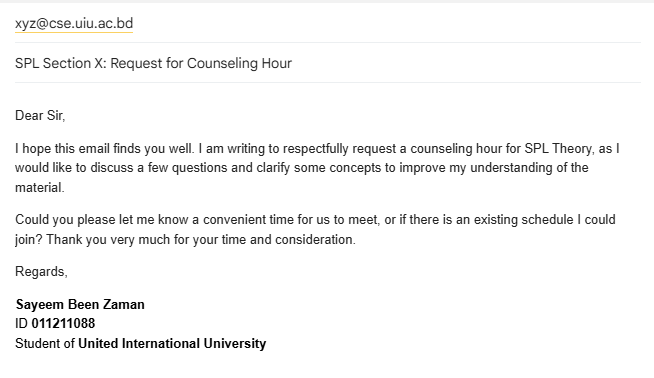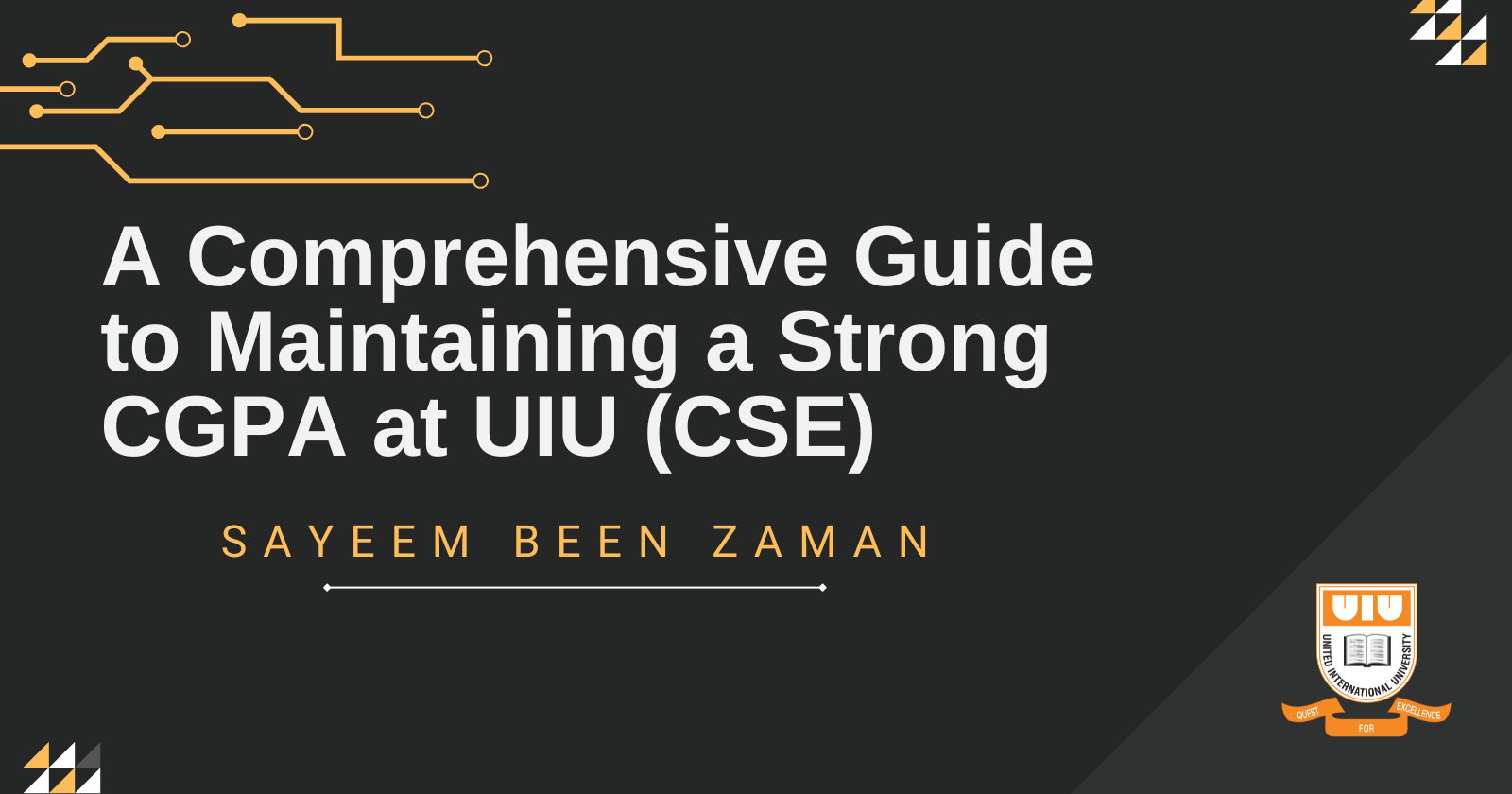I’ve noticed that many talented students struggle initially at UIU simply because they’re unsure about effective study methods. It often takes nearly a year to adjust, and during that time, most students' CGPAs drop. To help with this, I’m creating a guideline on how to maintain a good CGPA, based on what I’ve learned over the past years. I hope this will be helpful for the juniors.
"Be the mentor you wished for as a junior"
WHAT TO DO ALWAYS?
Attend every single class
Pay proper attention to each lecture
Write down everything, I mean everything!
Rewrite those in an organized format at home after every class
If you have any doubts about any topics, visit your faculty during counseling hours; if you don’t have any doubts still see them to maintain a good relationship with your respected faculty.
Take every exam seriously
Many seniors are eager to offer guidance, so don’t hesitate to reach out for help
Study in a group; Group members shouldn’t have to be toppers but those who try their best
Help others whenever you can! Teaching others is one of the most effective ways to refine your skills.
Look for online resources on YouTube or Google, there are plenty of resources for Computer Science.
For coding labs like ICS, SPL, DS I, and DS II, solve at least one coding problem daily, there's no shortcut to coding, and I’ll list some websites at the end for extra practice.
It varies how many hours you should spend weekly studying. Some students can cover it just by reading before exams, while others need more time. Try your best and don’t lose hope.
Use Google Calendar to organize your exam, assignment dates and deadlines
Use Google Keep to take quick notes
Learn How to write a proper Email, I will give a quick guide at the end
Practice typing for at least an hour each week. As a CSE student, you should aim for a typing speed of at least 30 words per minute (WPM). You can use MonkeyType to improve your typing skills.
WHAT TO DO Before EXAMS?
Write down your entire syllabus
If you followed my previous instructions, you should now have notes on each topic.
Finish every topic one by one
If needed write again to memorise theory topics
Solve previous year's questions by yourself (THIS IS A MUST!)
You can write a cheatsheet to memorize the contents easily (I personally do this)
Put twice the effort into preparing for the final as you did for the midterm. Many students score high on the midterm but miss out on an A grade by not taking the final as seriously. The final covers harder questions and topics, so it’s essential to double the preparation.
Lastly, believe in yourself, you can and will ace the exam!
WHAT NOT TO DO?
Avoid procrastination, and stick to every deadline
Don't adopt the mindset that you can pass the exam by copying from others.
Avoid relying on ChatGPT for everything, especially if you're in your first year. It's important to grasp the basics for your advanced courses. If you complete assignments using ChatGPT, you may find yourself struggling later on.
Don’t take any exams or even a presentation lightly, if your goal is an A, every mark counts.
Don’t take too much pressure if you can’t handle it, take a minimum amount of credit from the beginning (9-11 credits). This may mean completing your degree in around 13 trimesters, but in return, you'll achieve a strong CGPA and gain valuable skills useful for after graduation.
Limit yourself to one project per trimester. Handling both a software and an electronics project simultaneously can be overwhelming.
Try to take the theory course along with its corresponding lab, such as SPL with SPL Lab.
Avoid being overconfident or showing off.
How to write a proper Email?
Writing a proper email is essential and often makes a big difference. Many faculty members may not pay much attention if the email isn’t well-structured. Follow these steps to write a proper email:
Always use your university email
Provide a clear subject line that specifies the email’s purpose; for example, if you’re requesting a counseling hour for SPL Theory, your subject could be "SPL Section X: Request for Counseling Hour."
Compose the email formally, starting with a polite greeting like "Dear Sir, I hope this mail finds you well."
Include your full name, university ID, course title, and section at the end.
You can use an automatic signature to display your full name and ID. For more details on setting up a signature, follow this.

Course-Wise Guideline
Introduction to Computer Systems (ICS)
Learn the basics of the C programming language. Understanding how to handle input and output, declare variables, use loops, apply switch statements, and work with 1D arrays will be sufficient for this course. Since the course outline may change each trimester, stay updated on any changes. You can follow
Anisul Islam's C programming playlist on YouTube as a resource.
Structured Programming Language Laboratory (SPL Lab)
You need to learn how 1D and 2D arrays work, as well as structures, pointers, strings, recursion, functions, and file I/O in C. Look up each topic on
YouTube or Google to find resources that suit your learning style best.
Object Oriented Programming Laboratory (OOP Lab)
Begin with learning basic Java syntax, how Java functions, arrays, classes, objects, using Scanner and Pane, inheritance, methods, abstract classes, GUI, I/O exceptions, and threading. I recommend choosing an
OOP playlist on YouTube and completing it to get ahead in class.
Advanced Object Oriented Programming Lab (AOOP Lab)
This is your first formal project course that will be showcased in a Project Show. In project courses, you’ll cover limited material in class since faculty can’t teach everything within a short timeframe. This is where independent learning begins.
Explore similar projects on YouTube or Google using Java and JavaFX to see how they are made. After reviewing some projects, you’ll start to understand what you can do with Java.
Data Structure and Algorithms I Laboratory
The DS I & II courses are essential in CSE. In DSA I, you’ll mainly use C programming to implement various algorithms. To get a head start, consider studying the following topics on YouTube:
Sorting Algorithms: Bubble Sort, Insertion Sort, Selection Sort, Quick Sort, Merge Sort
Data Structures: 1D/2D Array, Vector, Linked List, Stack, Queue, Binary Search Tree, Heap, Priority Queue, BFS, and DFS
Data Structure and Algorithms II Laboratory
In DS II, you’ll first need to learn C++, which is quite similar to C but more advanced. Be sure to review the syntax, recursion, functions, and pointers in both C and C++. To get ahead in class, consider studying the Divide and Conquer algorithm, practicing online recursive problems, and exploring
Greedy Algorithms like the Knapsack and Fractional Knapsack problems. Additionally, look into
Dynamic Programming,
Disjoint Sets,
Minimum Spanning Tree, and
Shortest Path algorithms like Dijkstra, and Bellman-Ford.
Database Management Systems Laboratory
In this course, you'll learn about MySQL, how databases operate, and you'll need to complete a project that involves PHP, MySQL, and queries. There are many resources available on YouTube for you to explore.
System Analysis and Design Laboratory
This lab is primarily project-based. I recommend starting with a framework like MERN or Laravel. Learning a framework early will give you skills you can use to develop websites in labs like DBMS, SAD, SE, and Web Programming.
Software Engineering Laboratory
As I mentioned in the SAD Lab, mastering a framework will enable you to excel in projects in the SE Lab as well. In class, you'll be learning about React, black-box and white-box testing, JavaScript, and software testing tools like Selenium.
Artificial Intelligence Laboratory
This is another coding-intensive lab that is just as important as DS I & II. You will need to learn the Python programming language. If you're not familiar with Python, I recommend choosing a YouTube playlist and completing it first. After that, you’ll be taught various algorithms, including the
A* Searching Algorithm,
Hill Climbing Searching Algorithm,
K-Nearest Neighbors Algorithm, Logistic Regression, and K-Means Clustering.
Web Programming
This is a 3-credit course that includes a lab session once a week. You will have a MID and a Final exam, either written or online, similar to theory courses. In this course, you will learn about HTML, CSS, JavaScript, PHP, MySQL, and queries. It is considered a relatively easy course, and by the end, you will be required to submit a website using any framework.
Final Year Design Project (I, II, III)
This is a special type of course that holds significant value for your graduation. I recommend taking these three courses in your last three trimesters so that you will have a clearer idea of your career path. First, you need to form a team of at least three members. Then, based on your chosen career area (such as Bioinformatics, Computer Vision, or Software/Website Development), approach a faculty member to be your supervisor. If the faculty member agrees, you can submit a form obtained from the CSE Department. Keep in mind that FYDP I, II, and III must be completed with the same team and supervisor, so choose wisely. There will be weekly classes for FYDP I, similar to a lab course, while FYDP II and III will not have classes.
RESOURCES
UIU Lectures: UIU DOC, UIU Classbox, UIU Helpline
Previous Year Question Bank: UIU Scholar’s Squad, Question Archive
Useful YouTube Channels: Neso Academy, Abdul Bari, Anisul Islam, Farhan Hossan, CodeWithHarry, Jenny's Lectures CS IT
Websites to Practice Code: Beecrowd, Codeforces, Hackerrank, CodeChef, Codewars, LeetCode
Websites to Learn Coding: W3Schools, Programiz, freeCodeCamp, Codecademy, The Odin Project
Frequently Asked Questions (FAQ)
What are GPA and CGPA?
GPA is the average of grades for a specific trimester and CGPA is the overall average of GPAs across all trimesters.
Are Scholarships and Waivers the same thing?
No, Scholarships & Waivers are completely different. You can achieve scholarships each trimester based on your GPA, while waivers are based on your HSC/O Level/A Level result
What is the scholarship scheme at UIU?
Is my scholarship applicable for retake courses?
NO. However, if you achieve good grades in a trimester (including retake courses), those grades in retake courses will be considered for the next scholarship.
Do I have to follow the given Course Plan?
This is the
Course Plan for CSE. UIU is an open credit university, so you don’t have to follow the course plan. You can enroll in any course during any trimester as long as you meet the course prerequisites.
Meaning of Retake/Repeat/’I’ Grade/Trimester Drop
Retake: A student obtaining an “F” grade in any course in any Trimester will have to “Repeat” the course with full payment of tuition fee for that particular course. [First Time of a particular course Retake will be 50% of full payment] Repeat: Students who wish to improve their grades can retake courses, known as "Retake" courses. However, they will need to pay the full tuition fee for retaking a course. ‘I’ Grade: An "I" (Incomplete) grade is given only in exceptional circumstances, such as severe illness or an accident. Trimester Drop: A student may drop a trimester only for medical reasons or other valid justifications. If the authorities determine the case to be genuine, the student may receive a 50% refund.
Important Contacts
I got ‘F’ grades in some courses, when should I take those?
It actually depends on several factors. If you’re in your first year and received an 'F' in core courses like ICS, SPL, OOP, DS I, Electrical Circuits, or Calculus, you should retake them in the next trimester, as they are prerequisites for your upcoming courses. If you failed to pass non-departmental courses like Physics, Biology, BDS, IPE, ACT, or Psychology, there’s no rush, you can retake them in your 3rd or 4th year.
I got low grades in some courses; when should I take them to improve my CGPA?
For CGPA improvement, consider waiting until your 3rd or 4th year. During those last two years, you'll face many challenging courses, so if you retake one course each trimester, it will balance out with both hard and easier courses.
Which two courses would be best to take from the optional section?
As per the course plan, you must complete two courses from the optional section, which totals 6 credits. If you like math, you should choose IPE and Accounting. If you prefer theory, consider taking Psychology and Economics. Other courses are not available because of low student enrollment.
In which sector should I choose to major?
The rules for choosing a major require you to take at least 3 elective courses from a specific sector, for a total of 5 elective courses. There are 7 sectors available for your major: Computational Theory, Network & Communication, Systems, Data Science, Software Engineering, Hardware, and Information & Communication Technology (ICT). Among these, majors in Data Science, Software Engineering, and ICT are viable options, as the other sectors do not offer at least 3 courses due to low enrollment. It's advisable to select your elective courses at the end of your 3rd trimester, as by that time, you'll have a better understanding of which sector you want to pursue after graduation. If you're interested in developing websites or software and want to work as a Software Engineer, consider choosing Software Engineering or ICT as your major. If you prefer an academic career, such as teaching or research, Data Science would be a suitable choice. Ultimately, the decision on which sector to pursue is yours.
All praise belongs to Allah
Subscribe to my newsletter
Read articles from Sayeem Been Zaman directly inside your inbox. Subscribe to the newsletter, and don't miss out.
 Sayeem Been Zaman
Sayeem Been Zaman

